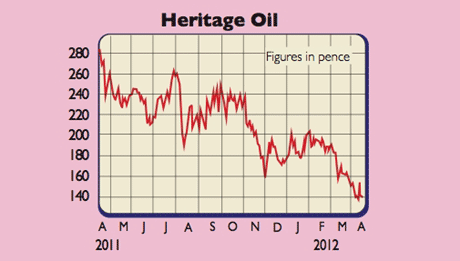Get the latest financial news, insights and expert analysis from our award-winning MoneyWeek team, to help you understand what really matters when it comes to your finances.
You are now subscribed
Your newsletter sign-up was successful
Want to add more newsletters?

Twice daily
MoneyWeek
Get the latest financial news, insights and expert analysis from our award-winning MoneyWeek team, to help you understand what really matters when it comes to your finances.

Four times a week
Look After My Bills
Sign up to our free money-saving newsletter, filled with the latest news and expert advice to help you find the best tips and deals for managing your bills. Start saving today!
Independent oil and gas explorer Heritage Oil has seen its share price fall by 75% since it peaked at £6 back in 2009. At current levels, the shares now look like a steal. Heritage operates in early-stage frontier markets where big oil often fears to tread. It owns a fledgling production operation in Russia, along with a large untapped hydrocarbon field in the Kurdistan province of Iraq. It also has exploration blocks in the Congo, Malta, Pakistan, Tanzania and Mali and a subsidiary in Libya.
But the firm's trophy asset is the Miran block in Kurdistan. Here the company has discovered a colossal gas reserve, which it hopes to exploit over the next five years. If successful this project alone could be worth more than the firm's entire market capitalisation of £400m.
Elsewhere, output from its Zapadno Chumpasskoye field in Western Siberia is ticking along nicely at 882 barrels per day. This is expected to increase and has been independently certified to be worth $298m (about 80p per share). Adding on the option value of the other licenses and around $200m of net cash, I would value the entire group on a sum-of-the-parts basis, at about 250p per share 60% above today's price.
MoneyWeek
Subscribe to MoneyWeek today and get your first six magazine issues absolutely FREE

Sign up to Money Morning
Don't miss the latest investment and personal finances news, market analysis, plus money-saving tips with our free twice-daily newsletter
Don't miss the latest investment and personal finances news, market analysis, plus money-saving tips with our free twice-daily newsletter
Heritage Oil (LSE: HOIL), rated a BUY by Fox-Davies Capital

Heritage isn't for the faint-hearted. Kurdistan has been engaged arguing with the Iraqi government over how to split the tax revenues from oil fairly. However, I think the two sides will settle their differences. If they don't, and foreign investment pulls out, neither will benefit.
Another problem is Heritage's ongoing dispute with the Ugandan tax authorities, after the firm sold a field in the country to Tullow Oil for $1.45bn. The Ugandans have already deducted $404m in capital gains tax, but Heritage claims this contravenes the parties' production-sharing agreement.
The matter has been referred to arbitration in the British courts. Other threats include project delays, drilling setbacks, oil and gas price volatility and foreign-currency fluctuations. But these concerns are more than factored into the ultra-low valuation. CEO and founder Tony Buckingham seems to agree he has a 29.4% stake.
FoxDavies Capital has a price target of 315p, with full-year results scheduled for the end of the month.
Rating: SPECULATIVE BUY at 152p
Paul Hill also writes a weekly share-tipping newsletter, Precision Guided Investments. See www.moneyweek.com/PGI , or phone 020-7633 3634 for more.
Get the latest financial news, insights and expert analysis from our award-winning MoneyWeek team, to help you understand what really matters when it comes to your finances.
Paul gained a degree in electrical engineering and went on to qualify as a chartered management accountant. He has extensive corporate finance and investment experience and is a member of the Securities Institute.
Over the past 16 years Paul has held top-level financial management and M&A roles for blue-chip companies such as O2, GKN and Unilever. He is now director of his own capital investment and consultancy firm, PMH Capital Limited.
Paul is an expert at analysing companies in new, fast-growing markets, and is an extremely shrewd stock-picker.
-
 Should you buy an active ETF?
Should you buy an active ETF?ETFs are often mischaracterised as passive products, but they can be a convenient way to add active management to your portfolio
-
 Power up your pension before 5 April – easy ways to save before the tax year end
Power up your pension before 5 April – easy ways to save before the tax year endWith the end of the tax year looming, pension savers currently have a window to review and maximise what’s going into their retirement funds – we look at how